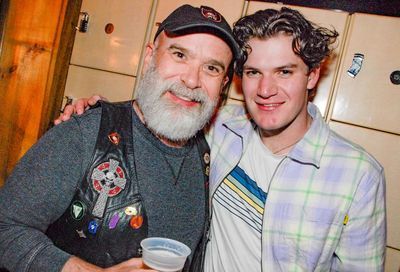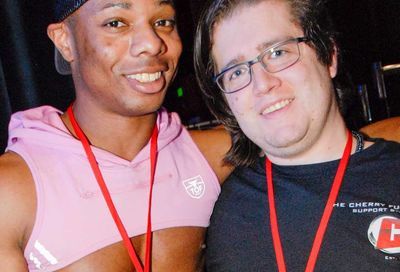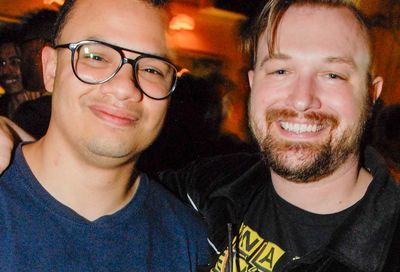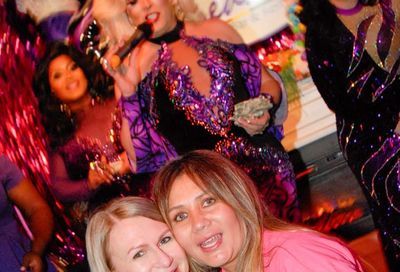Traditional Values
Commentary: OutRight
The headline of the lead story in last week’s Bay Area Reporter, San Francisco’s gay newspaper of record, said it all: ”Gay Families Join Easter Egg Roll.”
We’ve come a long way from the Stonewall riot, the sexual liberationism of the 1970s, and ”We’re Here, We’re Queer, Get Used to It.” There are unmistakable signs that the emphasis on relationships and families in gay life, politics and media is having traditionalizing effects on gay culture.
This is evident in the causes and trends that have dominated the gay movement for the past 15 years or so: serving in the military, joining the Boy Scouts, attending services at large gay-friendly churches, and above all, gay marriage.
This development can even be seen in America’s capital of gay sexual liberation, San Francisco. Recent stories in the B.A.R. and the Los Angeles Times document the beginnings of a change in attitudes toward open and explicit displays of sexuality in the Castro. The change is being spurred especially by gay families with children, who want a more family-friendly environment and are chafing at a culture they see as saturated with sex.
According to the L.A. Times:
”In the Castro, restaurants oriented toward gay singles now offer child-size portions and even highchairs. One coffee shop features a hot chocolate ‘Castro Kids Special,’ a popular item during the morning rush that the owners call the ‘stroller hour.’
”At Cliff’s Variety store, children shop for toy unicorns and jasmine-scented clay putty alongside cross-dressers perusing feather boas and rhinestone tiaras. . . .
”Last year, a lesbian mother of two, now 6 and 2, complained about a sadomasochistic tableau in a clothing shop window that featured a male mannequin chained to a toilet. ‘As an adult I find this disgusting,’ she wrote in an e-mail to city officials. ‘As a parent I find it unconscionable.”’
Just a couple of months ago, the B.A.R. ran several stories about a life-sized wooden statue of an aroused naked man that was displayed in a Castro storefront. Parents in the neighborhood objected that it should not be visible to children who pass by on their way to and from school. After police got involved, the owner reluctantly covered the statue’s private parts.
Some business owners are sensitive to families’ concerns. A lesbian mother reported to the Times that a clothing store manager helpfully warned her about taking her 12-year-old daughter into a back room where ”suggestive leather outfits were displayed.” With more children in the neighborhood, she predicted, ”businesses that accommodate the sensibilities of families will survive, while those that are less child-friendly will not.”
“Our kids need a place in the community,” said July Appel, executive director of an organization for gay families and a lesbian mother of two. “The Castro is big enough for everyone. Gay cruising has its place. But so do playgrounds.”
The trend is being felt beyond commercial venues, reaching into the heart of gay organizations and events. The annual gay pride parade in San Francisco, by far the largest in the country, now provides a children’s area with licensed day care. This year’s parade will include a float celebrating gay families, complete with children singing Village People songs.
At the gay community center, nudity is now forbidden in the hallways — requiring bondage classes to stay behind closed doors. “Twenty years ago we couldn’t have had such a rule,” the center’s director, Thom Lynch, told the Times. “People would have fought it.”
These changes in San Francisco reflect larger national trends in gay life. According to the 2000 Census, there are about 594,000 same-sex ”unmarried partner” households, almost evenly split between gay male and lesbian couples. The Census figure is almost certainly an undercount since many gay couples probably reported their status as ”boarders” or ”roommates” rather than as ”unmarried partners.”
Lots of children are being raised by these gay couples. Of the reported female partners, more than one third are raising children. Of the reported male partners, more than one fifth are raising children. That’s about 162,000 same-sex households in the U.S. raising children. This number, too, is almost certainly an undercount.
Once we include single gay people raising children, estimates of the total number of children in the U.S. being raised by gay parents (singles and couples) range from a low of 1 million to a high of 9 million. That’s between 1 percent and 12 percent of all the children in the country, though the lower range of the estimate is probably closer to the mark. By all accounts, the number of gay families is growing.
The effect of all this on gay culture is inescapable. Stable relationships have a settling effect on people. Saturday nights become an opportunity to stay home with your partner watching DVDs instead of another chance for a furtive sexual encounter.
Children encourage yet more domestication. Aside from the practical and time-consuming work that goes into raising kids, which reduces one’s energy and opportunities for libertinism, parents tend to be more concerned than single people about a community’s moral environment. It’s turning out that gay parents can be just as concerned about these matters as straight parents.
“Many gay people once referred to couples with children as ‘breeders,’ a term with considerable bite to it,” the director of the city’s gay community center observed. “It’s rarely used anymore. Now many gays are breeders as well.”
We’re here, we’re families, let the Easter Egg Roll begin.
Dale Carpenter is a law professor. He can be reached at outright@metroweekly.com. Some of his past columns can be read at www.indegayforum.com.
Support Metro Weekly’s Journalism
These are challenging times for news organizations. And yet it’s crucial we stay active and provide vital resources and information to both our local readers and the world. So won’t you please take a moment and consider supporting Metro Weekly with a membership? For as little as $5 a month, you can help ensure Metro Weekly magazine and MetroWeekly.com remain free, viable resources as we provide the best, most diverse, culturally-resonant LGBTQ coverage in both the D.C. region and around the world. Memberships come with exclusive perks and discounts, your own personal digital delivery of each week’s magazine (and an archive), access to our Member's Lounge when it launches this fall, and exclusive members-only items like Metro Weekly Membership Mugs and Tote Bags! Check out all our membership levels here and please join us today!





















